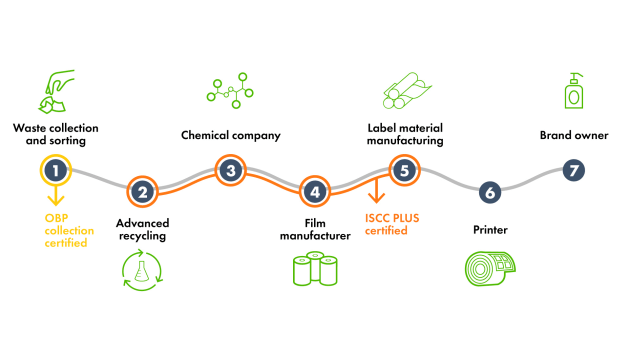UPM Raflatac has become the first company in the world to invest in Ocean Bound Plastics (OBP) waste as label raw material in its new Ocean Action labels.
“The new innovative Ocean Action label material is the latest step in our beyond fossils journey,” said Eliisa Laurikainen, business development manager at UPM Raflatac.
“It does not only help prevent the plastic waste from ending up in the oceans, but also offers brand owners the possibility to meet their recycled content targets for packaging.
“The Ocean Action label material is an easy-to-use, drop-in solution created, especially for food and cosmetics end-uses, as it has exactly the same performance as the current fossil-based labels.”
The Oceans Action label material is available as White and Clear Top Coated PP films with RP37, RF37 and RP74 adhesives, and PET 23 PCR and glassine liners.
The company said the label materials are a perfect fit for fast-moving consumer goods (FMCG), such as household goods, personal care, packaged foods and beverages.
To make Ocean Action label a commercially successful product, UPM Raflatac has collaborated closely with multiple partners in the value chain.
At the first stage, Malaysian-based plastic recycling company HHI collects and sorts the OBP waste with its partners. The company has OBP certification under the Zero Plastic Oceans program, which ensures the responsible sourcing, proper collection and management of OBP waste.
After collecting and sorting the OBP waste, HHI uses chemical recycling to convert the waste into pyrolysis oil, which is then used by SABIC to create high-quality PP plastic granulates.
“We are proud to offer our customers another more sustainable choice through the advanced recycling of used plastic, which could otherwise end up in our oceans and rivers,” said Lada Kurelec, general manager PP, PET, PS, PVC, PU and elastomers businesses for petrochemicals at SABIC.
“These labels containing OBP connect with our TRUECIRCLE program of circular solutions designed to help reduce plastic waste, mitigate fossil depletion, and protect our planet.”
After SABIC, the plastic granulates are used in the process in which the film manufacturer Taghleef Industries produces the label film, which is used to produce the final label material by UPM Raflatac.
“We are proud to be part of this initiative that represents a further step towards a more circular economy, thanks to an efficient reuse of valuable material, and is a responsible effort to preserve our environment, especially for younger generations,” said Simon Baldin, business unit manager – labels Europe at Taghleef Industries.
The plastic waste used in the value chain of making OBP label material is certified under the Zero Plastics Oceans program, and the final label material under ISCC Plus.






